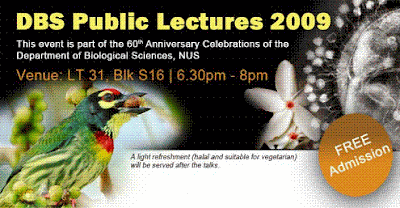 A talk by Prof. Richard Corlett, as part of the 60th anniversary celebrations of the Department of Biological Sciences, the National University of Singapore.
A talk by Prof. Richard Corlett, as part of the 60th anniversary celebrations of the Department of Biological Sciences, the National University of Singapore.A tree does not look very mobile, but movement is as important for plants as it is for animals. Plants can move at two stages of their life cycle: as pollen during sexual reproduction and as seeds during dispersal of the offspring, but only seeds can start a new population. An increasingly important reason for moving is climate change. Studies in Europe and North America have found numerous plant and animal species that have moved north, or to higher altitudes, in response to the warming over recent decades. Temperature changes are expected to be smaller in the tropics, but the impacts on tropical plant and animal species, which are adapted to very narrow temperature ranges, may be greater. Moreover, while a temperate-zone species may only have to move a few hundred kilometers north to compensate for a several degrees of warming, temperature gradients are not so steep in the tropics, so compensatory movements will need to be greater. Failure to move far enough fast enough has been termed 'migration lag'. Migration lag makes a species vulnerable to extinction as the local climate exceeds its range of tolerance.
More details about Prof. Richard Corlett and the talk.
Light refreshments will be served after the talk.
Admission is free but registration is required. More details on the Department of Biological Sciences website.
Time: 6.30-8pm
Venue: LT 31, Blk S16, National University of Singapore location map
Website and contact: http://www.dbs.nus.edu.sg/60anniversary/public_lectures.html